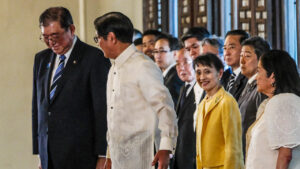THE Philippines and Japan have started negotiations on an acquisition and cross-servicing agreement (ACSA) to facilitate the exchange of defense supplies and logistical support.
“We agreed to start the negotiation through… the acquisition and cross-servicing agreement,” Japanese Prime Minister Shigeru Ishiba said in Japanese at a news briefing at the presidential palace in Manila on Tuesday.
“We also confirmed to start the government-to-government discussion on [the] potential conclusion of security of information agreement in the future,” he added.
Mr. Ishiba will be in the Philippines from April 29 to 30 after visiting Vietnam.
The deal would allow for greater logistical and operational interoperability between the Japanese Self-Defense Forces and the Armed Forces of the Philippines, including the exchange of supplies and services during joint exercises, peacekeeping operations and humanitarian missions.
The deepening strategic ties between Tokyo and Manila come amid rising tensions in the Indo-Pacific region, particularly in the East and South China Seas.
Mr. Ishiba cited the importance of trilateral cooperation with the US, saying the three nations have affirmed the importance of their growing security partnership.
“Having gone through close to a century of hardships and efforts by our forefathers, I am deeply moved that Japan and the Philippines are now partners closing on alliance,” he said.
Beyond defense, Mr. Ishiba and President Ferdinand R. Marcos, Jr., also discussed partnerships in agriculture, energy, infrastructure and disaster risk reduction.
Tokyo committed to use its technological expertise to support Manila’s goal of achieving upper-middle-income status through initiatives in telecommunications, mineral resources and the ASEAN-Japan Economic Co-Creation (AZEC) framework.
“I explained that we will work with the Philippines in a package of corporations covering telecommunications, AZEC, energy, mineral resources, infrastructure and disaster risk reduction and others,” he said. “The President and I agreed to further strengthen our partnership in these areas.”
Mr. Ishiba said he and Mr. Marcos also discussed the repercussions of US President Donald J. Trump’s tariff measures on the multilateral free trade system and the broader world economy.
The US earlier this month slapped almost all of its trading partners with massive tariffs. Japan is facing a 24% reciprocal tariff, while the Philippines will be facing 17%.
The Philippines and Japan will mark their 70th year of diplomatic relations next year. — Chloe Mari A. Hufana
